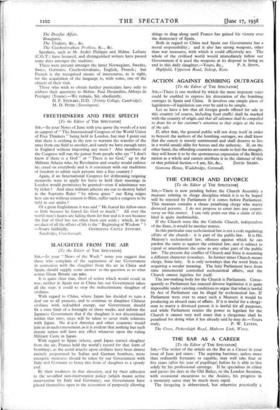THE CHURCH AND DIVORCE
[To the Editor of THE SPECTATOR] Stn, —There is now pending before the Church Assembly a measure relating to clergy discipline which it is to be hoped will be rejected by Parliament if it comes before Parliament. This measure contains a clause penalising clergy who marry divorced persons. I do not propose to enter into any contro- versy on this matter. I can only point out that a claim of this kind is quite inadmissible.
If the Church were like the Catholic Church, independent of the State, it would be another matter.
In this particular case ecclesiastical law is not a code regulating affairs of the church : it is part of the public law. It is His Majesty's ecclesiastical law, offences against which he can pardon the same as against the criminal law, and is subject to repeal or amendment the same as any other part of the public law. The present day conflict of Church and State is assuming a different character nowadays. In former times Church meant clergy, State laity. It is only nowadays that the word State is acquiring a secular meaning. The laity Parliament have from time immemorial controlled ecclesiastical affairs, and the Church cannot legislate for itself.
The law-making body for the Church is Parliament. Conse- quently as Parliament has enacted divorce legislation it is quite impossible under existing conditions to argue that what is lawful by Act of Parliament can be illegal by ecclesiastical law. If Parliament were ever to enact such a Measure it would be producing an absurd state of affairs. If it is lawful for a clergy- man to marry a divorced person it is lawful for all purposes, and while Parliament retains the power to legislate for the Church it cannot very well enact that a clergyman shall be penalised for doing what it has already said he may do.—Yours


















































 Previous page
Previous page